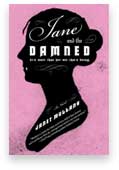Jane and the Damned review
 After reading of Elizabeth Bennet killing zombies and Elinor Dashwood fighting sea monsters and following Queen Victoria as she learned to be a demon hunter or learning that Shakespeare was a vampire, I was in a “here we go again” mood for Jane and the Damned by Janet Mullany. But as I finished the book in short order (despite a little break at the beginning caused by that here we go again attitude), I obviously enjoyed it a great deal (which still doesn’t mean I’m not wary of the trend started by Seth Grahame-Smith).
After reading of Elizabeth Bennet killing zombies and Elinor Dashwood fighting sea monsters and following Queen Victoria as she learned to be a demon hunter or learning that Shakespeare was a vampire, I was in a “here we go again” mood for Jane and the Damned by Janet Mullany. But as I finished the book in short order (despite a little break at the beginning caused by that here we go again attitude), I obviously enjoyed it a great deal (which still doesn’t mean I’m not wary of the trend started by Seth Grahame-Smith).
Jane and the Damned follows our heroine Jane Austen as she goes from a disappointed novelist to a blood-sucking fiend while simultaneously fighting off a French invasion. Of course, to call her a fiend is unfair; a fiend doesn’t usually worry about the etiquette and grammar of dining, and these vampires seem to spend as much time snacking on each other as they do the general public. In fact, a good deal of the book involves navigating the rules of polite vampire society, which could be a problem for some readers. The setup, that the French invade England while Jane is in Bath to take the waters (very, very cleverly a cure for both gout and vampirism), would have you think you have a rip-roaring adventure in your hands; but wait this is Jane Austen so the book must be about society and manners, only this time it’s vampire society instead of the haut ton. So if you have a friend like mine (“doesn’t anything ever happen in these books”), they might be disappointed to find Jane vacillating between duty to her family and the attractions of her new family when what she really needs to be doing is fighting the French.
The problem with her new family is that I just can’t believe the Jane Austen I think I know would want to spend any time with them. Lolling around sated after sex and dining (the polite term for feeding), doesn’t see like our Jane. But, of course, that’s Mullany’s cleverness. She recognizes that conflict in Jane as well. Tempted as she is by the excitement and power and romance of her fellow vampires, she’s still Jane and Mullany’s plot unfolds accordingly. In Mullany’s hands, Jane struggles to retains her good sense and her tragic suspicion that love just isn’t enough to throw away her sense of self.
And don’t worry, soon enough Jane is in the thick of things, sabotaging the French and enjoying freedoms a proper lady of the era couldn’t. And romance fans will enjoy her dilemma of choosing between two vampire lovers (a classic Austen conundrum, except for the vampire bit), the one who “made her” and the one who became her tutor or Bearleader, although in un-Austen like fashion I think Mullany made the choice too easy. I know who I was rooting for.
The book has a whole range of nice touches, including the phrase en sanglant for when your canines are showing, to Mullany’s decision to not make the vampires a secret society. Most vampire books devote a lot of word count toward keeping the existense of vampires a secret and I thought it rather brave of Mullany to eschew all that. There’s also a nice explanation for Jane’s eventual dedication to the Prince Regent in Emma that will delight Austen fans. And Jane’s last minute reprieve and a villain’s one last deperate act should satisfy any naysayer’s “doesn’t anything happen in these books!”
